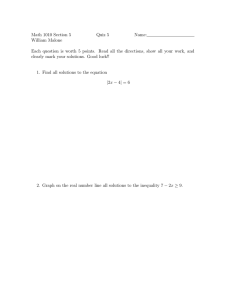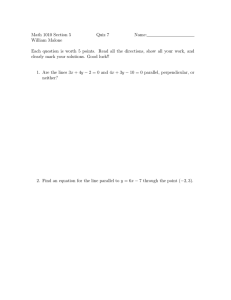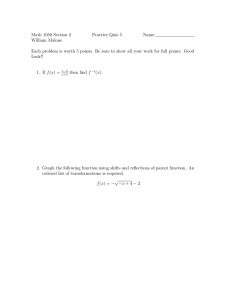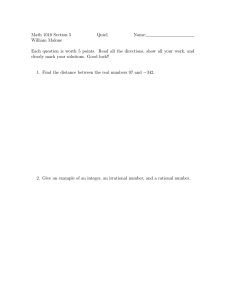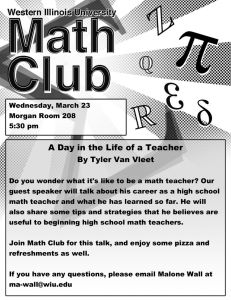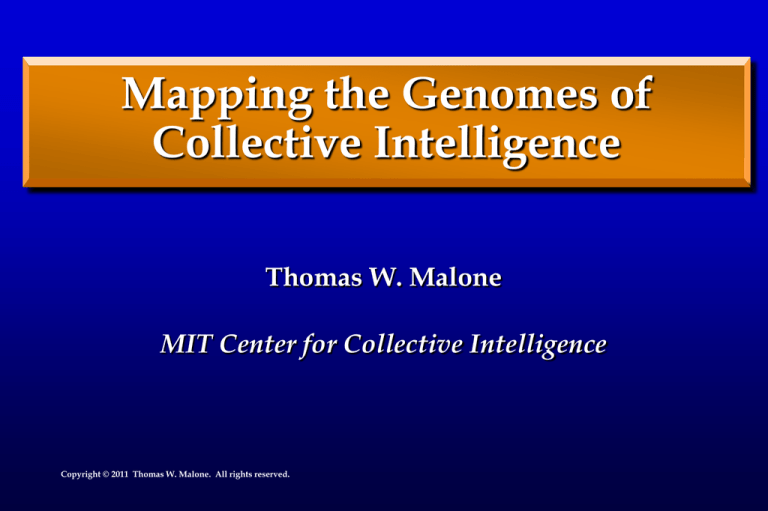
Mapping the Genomes of
Collective Intelligence
Thomas W. Malone
MIT Center for Collective Intelligence
Copyright © 2011 Thomas W. Malone. All rights reserved.
Copyright © 2011 Thomas W. Malone. All rights reserved.
Copyright © 2011 Thomas W. Malone. All rights reserved.
Copyright © 2011 Thomas W. Malone. All rights reserved.
Copyright © 2011 Thomas W. Malone. All rights reserved.
The Question
How can people and computers
be connected so that
—collectively—
they act more intelligently
than any person, group, or computer
has ever done before?
Copyright © 2011 Thomas W. Malone. All rights reserved.
Mapping the genomes for
crowd intelligence
• Different types of collective intelligence embody different
design patterns.
• Let’s call these design patterns “genes.”
• For each gene (and common combinations), we can map:
– Examples
– Situations where useful
– Limitations
–…
Copyright © 2011 Thomas W. Malone. All rights reserved.
Every activity must have genes to answer
four questions
Strategy
What
Staffing
Who
Why
Incentives
How
Structure
Process
Copyright © 2011 Thomas W. Malone. All rights reserved.
Types of organizational genes
Create
Decide
What
Crowd
Hierarchy
Money
Who
Why
Glory
Love
How
Crowd
Independent
Dependent
Create
Collection
Collaboration
Decide
Individual
decisions
Group decision
Copyright © 2011 Thomas W. Malone. All rights reserved.
Example:
Genetic structure of Linux
Example
What
Who
Why
How
Create
New software
modules
Crowd
Love
Glory
Collaboration
Decide
Which modules
warrant inclusion
in next release
Torvalds
and
lieutenants
Love
Glory
Hierarchy
Linux
Copyright © 2011 Thomas W. Malone. All rights reserved.
Who?
Who does the activity?
Hierarchy
Crowd
One or a few people from a
small, preselected group
Selecting modules
for Linux
Anyone who wants to in a large
Editing Wikipedia
group
Copyright © 2011 Thomas W. Malone. All rights reserved.
Who?
Who does the activity?
Hierarchy
Crowd
One or a few people from a
small, preselected group
Selecting modules
for Linux
Anyone who wants to in a large
Editing Wikipedia
group
Copyright © 2011 Thomas W. Malone. All rights reserved.
When is the Crowd gene useful?
• The resources useful in solving the problem are distributed
widely (or in unknown places).
• The problem can be divided into pieces such that:
– Single individuals can do the pieces.
– Enough individuals can be found and are (or can be) sufficiently
motivated to participate.
– The current owners of necessary information are willing to share it
with the “crowd.”
– Gaming and sabotage can be managed satisfactorily.
–…
Copyright © 2011 Thomas W. Malone. All rights reserved.
Why?
• Money
– Direct payment
– Help in getting future payment (e.g., advertising, learning)
• Love
– Opportunities to socialize
– Direct enjoyment of activity
– Contribution to some larger cause
– Enables access to something else desirable (e.g., captchas)
• Glory
– Recognition
• …
Copyright © 2011 Thomas W. Malone. All rights reserved.
When are the Why genes useful?
• There are many complex factors here!
• Appealing to Love and Glory, rather than Money, can often
(though not always) reduce costs.
• It is often possible to influence the direction and speed of a
group’s activities by providing Money or Glory based on
specific goals and deadlines.
•…
Failure to get motivational factors right is probably the single
greatest cause of failure in collective intelligence experiments.
Copyright © 2011 Thomas W. Malone. All rights reserved.
Types of organizational genes
What
Crowd
Hierarchy
Who
Money
Why
How
Love
Glory
Copyright © 2011 Thomas W. Malone. All rights reserved.
What?
• Create
– E.g., create Linux software modules
• Decide
– E.g., decide which Linux modules to include
Copyright © 2011 Thomas W. Malone. All rights reserved.
How?
Create
Decide
Crowd
Independent
Dependent
Collection
Collaboration
Individual
decisions
Group decision
Copyright © 2011 Thomas W. Malone. All rights reserved.
How?
Create
Crowd
Independent
Dependent
Collection
Collaboration
• Contest
Decide
Individual
decisions
Group decision
Copyright © 2011 Thomas W. Malone. All rights reserved.
Gene: Collection
• Create pieces that can be made mostly independently of
each other:
– Wikipedia (collection of articles)
– Digg
– Slashdot
– YouTube
–…
Copyright © 2011 Thomas W. Malone. All rights reserved.
Wikipedia - Article
Copyright © 2011 Thomas W. Malone. All rights reserved.
Intellipedia
• Wikipedia-like system for sharing information in the
US intelligence community (CIA, DoD, etc.)
• Over 100,000 users
• One goal: Help different parts of the intelligence
community “connect the dots” more effectively
Copyright © 2011 Thomas W. Malone. All rights reserved.
When is the Collection gene useful?
• Conditions for Crowd, plus:
– The activity can be broken into small pieces that can be done
mostly independently of each other.
» E.g., each is a complete solution to someone’s problem
– There are ways for people to find the pieces they want in the
collection.
» E.g., the pieces are rated (in a later step) for interestingness
– There are enough people who want this kind of thing in the
first place.
–…
Copyright © 2011 Thomas W. Malone. All rights reserved.
Gene: Contest
• A subtype of Collection where one or a few items in
the collection are selected as winners
• Examples
– InnoCentive
– Goldcorp challenge
– TopCoder
– Threadless
– Netflix prize
– Matlab
– Yahoo Answers
Copyright © 2011 Thomas W. Malone. All rights reserved.
Netflix Prize
• Netflix algorithm predicts which customers will like
which movies, based on previous customer ratings of
the same movies
• Netflix offered $1M prize to the first team that
improves predictions by > 10%
• Huge amount of effort expended by teams all over the
world.
• Winning team included several previously competing
teams which combined their ideas.
Copyright © 2011 Thomas W. Malone. All rights reserved.
TopCoder
• Software development firm with over 200,000
registered freelance programmers from all over the
world.
• For each programming task, freelance programmers
compete to do task (design, coding, integration,
testing).
• Best versions win prize money.
• Some programmers from low wage countries have
made over $100,000.
Copyright © 2011 Thomas W. Malone. All rights reserved.
When is the Contest gene useful?
• Conditions for Collection, plus:
– Only one (or a few) good solutions are needed.
– People are motivated by winning the contest
» E.g., for recognition or financial reward.
– When whole solutions are required to enter contest:
» People are willing to submit a whole solution with no
guarantee of reward.
» The creator of the contest wants to control financial risk.
• No award is given unless someone solves the problem
Copyright © 2011 Thomas W. Malone. All rights reserved.
How?
Create
Decide
Crowd
Independent
Dependent
Collection
Collaboration
Individual
decisions
Group decision
Copyright © 2011 Thomas W. Malone. All rights reserved.
Gene: Collaboration
• Create pieces with important dependencies among
themselves
• Examples
– Wikipedia (individual articles)
– Linux
– Writing a business book Wikipedia-style
– Climate Collaboratorium
Copyright © 2011 Thomas W. Malone. All rights reserved.
Wikipedia – Talk page
Copyright © 2011 Thomas W. Malone. All rights reserved.
A Linux discussion forum
Copyright © 2011 Thomas W. Malone. All rights reserved.
Writing a business book
Wikipedia-style
• Title: “We Are Smarter Than Me”
• Joint project: MIT Sloan, Wharton,
Pearson Publishing, Shared Insights
• Over 4,000 people registered
• Result: Hardback book published by
Pearson in Fall 2007
• But the community didn’t really write it!
Copyright © 2011 Thomas W. Malone. All rights reserved.
When is the Collaboration gene useful?
• Conditions for Crowd, plus:
– There are benefits of doing large scale things, and there
is no satisfactory way of breaking the activity into small
independent pieces
» Otherwise Collection would be better
– There are satisfactory ways of managing the
dependencies among the pieces
» See alternatives for Decision gene
Copyright © 2011 Thomas W. Malone. All rights reserved.
How?
Crowd
Create
Decide
Independent
Collection
Dependent
Collaboration
Individual
decisions
Group decision
•Voting
•Prediction markets
Copyright © 2011 Thomas W. Malone. All rights reserved.
When is the Group Decision gene useful?
• Conditions for Crowd, plus:
• Everyone in the group needs to abide by the same
decision.
– What prediction will we base our plan on?
– What features will our product have?
– What move will we make?
Copyright © 2011 Thomas W. Malone. All rights reserved.
Gene: Voting
• Digg
• IBM Jams (evaluation phase)
• Schaumburg Flyers
• Ebbsfleet United
• Kasparov v. the World
• Threadless
Copyright © 2011 Thomas W. Malone. All rights reserved.
Schaumburg Flyers
• Minor league baseball team near Chicago
• Through Internet voting, fans decide batting order,
pitching rotation, starting line-up, and which players
to trade
• Goal: Reality Baseball with fans all over the world
visiting the web site frequently
• Result: Team had disappointing season. Some people
blamed voting for bad results.
Copyright © 2011 Thomas W. Malone. All rights reserved.
Ebbsfleet United
• UK football (soccer) team
• Shares purchased by over 30,000 members in over 80
countries
• Membership fee: £50 / yr (appx. $77)
• Members vote on team selection, final budgets, player
trades
Copyright © 2011 Thomas W. Malone. All rights reserved.
Kasparov vs. the World
• Players:
– Gary Kasparov (world chess champion, 1999) vs. the rest
of the world (moves decided by majority vote)
– Kasparov heavy favorite before play began.
– Used on-line discussions, and suggestions by 5 wellknown chess experts
• Result: Kasparov won after 62 moves in 4 months.
• He said it was the hardest game he ever played.
Copyright © 2011 Thomas W. Malone. All rights reserved.
When is the Voting gene useful?
• Conditions for Crowd and Group Decisions:
– The average voter has enough information, skill,
and motivation to make a good decision
– A single decision for the whole group is needed
–…
• Plus:
– It is important for the group to be committed to the
decision.
Copyright © 2011 Thomas W. Malone. All rights reserved.
Gene: Prediction markets
• Example: Predict future sales of HP printers
• Approach: Participants buy and sell predictions of
future sales
– E.g., Buy a “share” predicting sales in Sept.
between 1501 and 1600 units
» If correct: get $1
» If wrong: get $0
Copyright © 2011 Thomas W. Malone. All rights reserved.
HP’s prediction markets (cont.)
• Participants were mostly from HP sales force
• 10 sales ranges
• Each person starts with 20 shares
• Market open for several days.
• Result: Better predictions than official HP sales
forecasts
Copyright © 2011 Thomas W. Malone. All rights reserved.
Other examples of prediction markets
• Google – no. of users for current products, launch
dates for new products
• Microsoft – release dates of products and internal
tools
• Others – Eli Lilly drug testing, US Presidential
elections, movie revenues, technological progress, . . .
Copyright © 2011 Thomas W. Malone. All rights reserved.
When is the
Prediction Market gene useful?
• Conditions for Group Decision, plus:
– Continuously updated information is useful
– Providing strong incentives for information
gathering and participation is important
– Biases and non-independent information are okay,
as long as some people have useful information
Copyright © 2011 Thomas W. Malone. All rights reserved.
When is the
Prediction Market gene not useful?
• The outcomes to be predicted cannot be objectively
verified in a reasonably short amount of time
• There isn’t enough time (or other resources) to run a
prediction market
Copyright © 2011 Thomas W. Malone. All rights reserved.
How?
Create
Decide
Crowd
Independent
Dependent
Collection
Collaboration
Individual
decisions
Group decision
•Market
•Social network
Copyright © 2011 Thomas W. Malone. All rights reserved.
When is the Individual Decision
gene useful?
• Conditions for Crowd, plus…
• Different people in the group can make their own
choices, without being bound by the choices others
make.
– What book will I buy?
– What web page will I look at?
– What photo will I buy?
Copyright © 2011 Thomas W. Malone. All rights reserved.
Gene: Market
• Individuals can make their own choices about what to
use, independent of what others choose.
– They are often influenced by what others choose, but they are not
required to choose the same thing.
• Their decisions are based, in part, on formal exchange
using an explicit currency.
Copyright © 2011 Thomas W. Malone. All rights reserved.
Market examples
• Traditional markets
– InnoCentive
– eBay
– iStockPhoto
– Amazon Mechanical Turk
• Internal markets
– Manufacturing resources (Intel scenario)
Copyright © 2011 Thomas W. Malone. All rights reserved.
Amazon Mechanical Turk
• Name comes from 18th century chess-playing
“automaton” that actually had a small chess master
inside
• On-line marketplace for work that requires human
intelligence (and can’t be done by computers)
– Transcribing audio
– Understanding news articles
– …
• Many tasks are very small and pay only a few cents.
Copyright © 2011 Thomas W. Malone. All rights reserved.
Copyright © 2011 Thomas W. Malone. All rights reserved.
When is the Market gene useful?
• Conditions for Individual Decisions, plus:
– Money is useful to motivate people to provide the
necessary effort or other resources
» People are often more motivated and creative
when they are rewarded directly for their own
efforts
– Many people can work flexibly and simultaneously
to achieve an overall goal.
Copyright © 2011 Thomas W. Malone. All rights reserved.
When is the Market gene not useful?
• Sometimes it’s hard to create conditions where
individuals, trying to maximize their own interests,
will achieve the overall goal desired.
• Markets generally require lots of communication to
find and compare alternatives and negotiate
agreements.
Copyright © 2011 Thomas W. Malone. All rights reserved.
Gene: Social network
• Like a market, individuals can make their own choices
about what to use, independent of what others choose.
– Though individuals are not required to make the same
choices as others, they are strongly influenced by the
opinions and preferences of people they know and trust.
• Unlike a market, there is no formal exchange of value
using an explicit currency.
Copyright © 2011 Thomas W. Malone. All rights reserved.
Social network examples
• Blogosphere
• YouTube popularity rankings
• Cyber-human intelligence
– Google rankings
– Amazon recommendation system
Copyright © 2011 Thomas W. Malone. All rights reserved.
Copyright © 2011 Thomas W. Malone. All rights reserved.
When is the Social Network gene useful?
• Conditions for Individual Decisions, plus:
– Non-monetary motivations are enough for people
to provide the necessary effort or other resources
– Information about others’ opinions helps people
make their own choices.
Copyright © 2011 Thomas W. Malone. All rights reserved.
How?
Create
Crowd
Independent
Dependent
Collection
Collaboration
• Contest
Decide
Individual
decisions
Group decision
• Voting
• Market
• Consensus
• Social network
• Prediction markets
Copyright © 2011 Thomas W. Malone. All rights reserved.
How?
Examples
Create
Crowd
Independent
Dependent
Collection
Collaboration
•YouTube videos
•Wikipedia (collection)
•InnoCentive
Decide
Individual
decisions
•iStockPhoto
•Google rankings
•Linux
•Wikipedia (article)
Group decision
•Kasparov v. World
•Prediction markets
Copyright © 2011 Thomas W. Malone. All rights reserved.
Types of organizational genes
Create
Decide
What
Crowd
Hierarchy
Money
Who
Why
Glory
Love
How
Crowd
Independent
Dependent
Create
Collection
Collaboration
Decide
Individual
decisions
Group decision
Copyright © 2011 Thomas W. Malone. All rights reserved.
Example:
Genetic structure of Wikipedia
Example
Decide
what
Wikipedia
articles to
include
Edit
existing
Wikipedia
articles
What
Who
Why
How
Create
New article
Crowd
Love
Glory
Collection
Decide
Whether to delete
(preliminary)
Crowd
Love
Glory
Voting
Decide
Whether to delete
(final)
Wikipedia
administrator
Love
Glory
Hierarchy
Create
New version of
article
Crowd
Love
Glory
Collaboration
Decide
Whether to keep
current version
Crowd
Love
Glory
Consensus
Copyright © 2011 Thomas W. Malone. All rights reserved.
Families of similar examples
Example
What
Why
How
Create
Scientific
solutions
Crowd
Money
Contest
Decide
Who gets
rewards
Management
Money
Hierarchy
Create
T-shirt designs
Crowd
Money
Contest
Decide
Which designs
are best
Crowd
Love
Averaging
Money
Hierarchy
InnoCentive
Threadless
Who
Decide
Which designs to
Management
use
Copyright © 2011 Thomas W. Malone. All rights reserved.
What does this mean for TMSP?
• Some of the most important innovations in the
coming decades will not be new technologies.
• They’ll be new ways of working together that are
made possible by these new technologies.
• New organizational design patterns (“genes”) and
new insights about what makes groups intelligent
can help create these new ways of working together.
Copyright © 2011 Thomas W. Malone. All rights reserved.
Copyright © 2011 Thomas W. Malone. All rights reserved.

